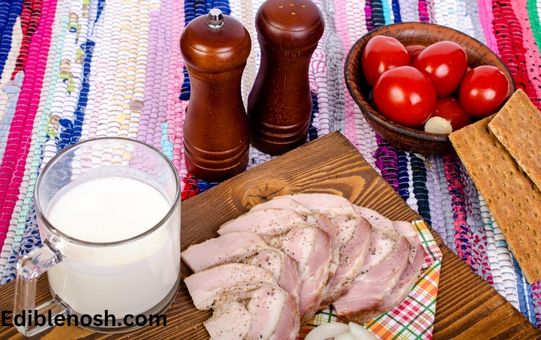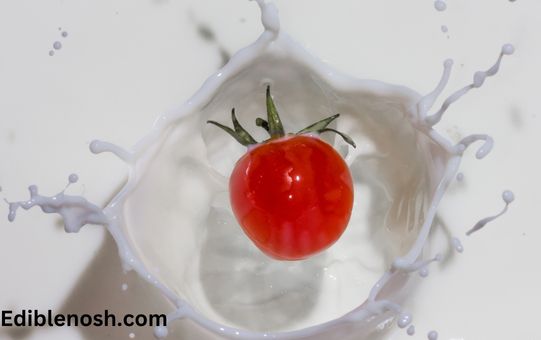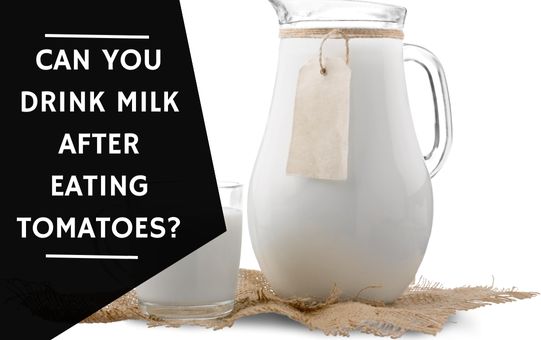Can You Drink Milk After Eating Tomatoes? It is a common question with a surprisingly complex answer. Lycopene, which is found in tomatoes, has been linked to cancer prevention. According to some studies, however, eating tomatoes after consuming milk may help prevent cancer.
It is generally safe to consume milk following the consumption of tomatoes. Although the acid in tomatoes may slightly reduce the pH of the stomach, it is unlikely to have a significant impact on the digestion of milk proteins. Nevertheless, some individuals may be lactose intolerant or have food allergies, which can cause digestive issues regardless of whether they have consumed tomatoes.
This article will examine the science underlying this age-old question and attempt to provide a definitive answer.
Contents
What is the science behind Drink Milk After Eating Tomatoes?
Following are the factors and science behind drinking milk after having tomatoes:
The Science of Digestion
To understand why some people believe that milk and tomatoes don’t mix, we first need to take a look at how digestion works.
When we eat, our bodies break down the food we consume into smaller molecules that can be absorbed and used for energy. This process begins in the mouth, where chewing and saliva help to break down the food.
From there, the food moves down the esophagus and into the stomach, where it is mixed with stomach acid and enzymes. This helps to break the food down even further and prepare it for absorption in the small intestine.
Now, here’s where things get a little bit complicated. Different foods are broken down and absorbed by the body in different ways. Some foods, like carbohydrates, are broken down into simple sugars that can be easily absorbed. Other foods, like proteins and fats, require more specialized enzymes to break them down.
This is where the idea that milk and tomatoes don’t mix comes into play. Milk is a source of protein, while tomatoes are a source of acid. Some people believe that the acid in tomatoes can interfere with the body’s ability to break down the protein in the milk, leading to digestive issues like bloating, gas, and diarrhea.
The Role of pH
So, is there any truth to this idea? It’s possible, but it’s also worth noting that the pH (or acidity) of different foods can play a role in how they are digested.
The pH scale ranges from 0 to 14, with 0 being the most acidic and 14 being the most alkaline. Foods that are highly acidic, like tomatoes, have a low pH, while foods that are more alkaline, like milk, have a higher pH.
When it comes to digestion, the pH of the food we eat can affect the pH of the digestive system. If we eat a lot of acidic foods, the pH of the stomach can become more acidic, which can interfere with the digestion of certain types of proteins.
However, it’s important to note that the pH of the stomach is already very acidic – around 2 on the pH scale. This is necessary for breaking down food and killing off any harmful bacteria. So while tomatoes may slightly lower the pH of the stomach, it’s unlikely to have a significant effect on the digestion of proteins like those found in milk.
Other Factors to Consider
There are a few other factors to consider when deciding whether or not to drink milk after eating tomatoes:
- Individual tolerance: Some people may be more sensitive to the combination of milk and tomatoes and may experience digestive issues as a result. It’s always a good idea to pay attention to your body and how it responds to different foods.
- Serving size: The larger the serving size of either milk or tomatoes, the more likely it is that you may experience digestive issues. It’s generally a good idea to eat and drink these foods in moderation.
- Other foods: The combination of milk and tomatoes isn’t the only food pairing that can cause digestive issues. For example, some people may experience bloating and gas after eating beans and dairy products together, or after eating certain types of fruit and vegetables together.
Read Also: Can You Cook Tomatoes In Stainless Steel?
The Risks of Drinking Milk After Eating Tomatoes
There are no significant risks associated with drinking milk after eating tomatoes. While some people may believe that the acid in tomatoes can interfere with the digestion of the protein in milk, leading to digestive issues like bloating, gas, and diarrhea, there is no scientific evidence to support this claim.
The pH of the stomach is already very acidic (around 2 on the pH scale), and it is necessary for breaking down food and killing off harmful bacteria. It is unlikely that the acid in tomatoes would significantly lower the pH of the stomach and affect the digestion of proteins found in milk.
However, some people may be lactose intolerant or have food allergies, which can cause digestive issues regardless of whether or not they’ve eaten tomatoes. It’s always a good idea to pay attention to your body and how it responds to different foods.

How to Enjoy Milk and Tomatoes Together?
If you enjoy both milk and tomatoes and want to eat them together, here are a few tips to help you enjoy them without experiencing any digestive issues:
- Eat them separately: Instead of eating milk and tomatoes together, try eating them at separate meals or as part of different dishes. This will help to ensure that your body has the time and resources it needs to properly digest each food.
- Choose low-fat milk: If you do want to eat milk and tomatoes together, opt for low-fat milk. This will help to reduce the amount of fat and protein you are consuming, which may make it easier for your body to digest.
- Eat in moderation: It’s generally a good idea to eat both milk and tomatoes in moderation. Large servings of either food can lead to digestive issues, regardless of whether or not they are eaten together.
- Drink plenty of water: Staying hydrated can help to flush out any toxins or waste that may be contributing to digestive issues. Make sure to drink plenty of water throughout the day, especially if you are eating milk and tomatoes together.
- Pay attention to your body: Finally, it’s important to pay attention to how your body responds to different foods. If you notice that you experience digestive issues after eating milk and tomatoes together, it may be a good idea to avoid this combination in the future.

Recipes Featuring Milk and Tomatoes
There are many delicious recipes that feature both milk and tomatoes as key ingredients. Here are a few ideas to get you started:
Tomato soup with grilled cheese sandwiches:
This classic comfort food pairs creamy tomato soup with crispy, melty grilled cheese sandwiches. Simply simmer diced tomatoes, onion, and garlic in a saucepan with some chicken broth and a splash of milk.
Season with salt, pepper, and any other spices you like, then blend until smooth. Serve hot, topped with a grilled cheese sandwich on the side.
Spaghetti with tomato cream sauce:
For a twist on traditional spaghetti and meatballs, try this recipe for spaghetti with tomato cream sauce. Cook spaghetti according to package instructions, then drain and set aside. In a separate pan, heat some olive oil and sauté diced onions and garlic.
Add a can of diced tomatoes and cook until they start to break down. Stir in some heavy cream and grated Parmesan cheese, then season with salt, pepper, and any other herbs or spices you like. Toss the sauce with the cooked spaghetti and serve hot.
Chicken parmesan with tomato sauce:
Chicken parmesan with tomato sauce
Add a can of diced tomatoes and simmer until the sauce has thickened. Stir in some milk or heavy cream to give the sauce a creamy texture, then season with salt, pepper, and any other herbs or spices you like.
Dip the chicken cutlets in a mixture of beaten eggs and milk, then coat them with breadcrumbs. Fry the breaded chicken in a pan with hot oil until it is cooked through and golden brown.
Top the cooked chicken with the tomato sauce and a sprinkle of mozzarella cheese, then bake in the oven until the cheese is melted and bubbly. Serve hot.
Read Also: Can You Cook Tomatoes In Cast Iron?
can i drink milk after eating tomato?
Yes, you can drink milk after eating tomato. There is no harm in consuming these two foods together. In fact, some people enjoy tomato soup with a dollop of cream or milk added to it.
However, if you have a personal intolerance or allergy to either milk or tomatoes, you should avoid consuming them together. Otherwise, there is no scientific evidence to suggest that drinking milk after eating tomato is harmful.
can you mix tomato and milk?
Yes, you can mix tomato and milk. There are many recipes that use tomato and milk together, such as creamy tomato soup, tomato and milk-based pasta sauces, and Indian tomato-based curries that use milk or cream.
Mixing tomato and milk together can create a creamy and flavorful dish. However, if you have a personal intolerance or allergy to either milk or tomatoes, you should avoid consuming them together.
Otherwise, there is no scientific evidence to suggest that mixing tomato and milk is harmful.
Conclusion
In general, it’s a good idea to pay attention to how your body responds to different food combinations and to make adjustments to your diet as needed. If you experience digestive issues after drinking milk and eating tomatoes, it may be a good idea to avoid this combination in the future.
FAQs | Drink Milk After Eating Tomatoes
Here are five relevant FAQs for the topic of “Can You Drink Milk After Eating Tomatoes?”:
Is It Safe To Drink Milk After Eating Tomatoes?
It is generally safe to drink milk after eating tomatoes. While some people may believe that the acid in tomatoes can interfere with the digestion of the protein in milk, leading to digestive issues like bloating, gas, and diarrhea, there is no scientific evidence to support this claim.
can we drink milk after eating tomato?
Yes, you can drink milk after eating tomato. Consuming tomato and milk in any order does not have any harmful effects on your health or digestion.
However, some individuals may be sensitive to certain foods and may experience discomfort or indigestion when consuming them together or in quick succession.
can we eat tomato and milk together?
Yes, you can eat tomato and milk together. There is no harm in consuming these two foods simultaneously, although they may not necessarily complement each other in taste.
However, if you have any specific dietary restrictions or medical conditions, it is recommended to consult with a healthcare professional before making any significant changes to your diet.
can we eat tomato after drinking milk?
Yes, you can eat tomatoes after drinking milk. There is no harm in consuming these two foods in any order, as they do not have any adverse effects on each other or on your digestive system.
However, some people may experience discomfort or indigestion if they consume certain foods together, so it is essential to pay attention to your body’s response and make dietary choices accordingly.
Can You Eat Milk And Tomatoes Together In Recipes?
Yes, milk and tomatoes can be enjoyed together in a variety of recipes. Some examples include tomato soup with grilled cheese sandwiches, spaghetti with tomato cream sauce, and chicken parmesan with tomato sauce.
Just be sure to pay attention to how your body responds to different food combinations, and make adjustments to your diet as needed.
can we eat tomato with milk?
While there are no harmful effects from combining tomatoes and milk, the combination may not be preferred due to conflicting tastes and textures. The acidity of tomatoes can curdle milk, altering its texture and taste. It is generally more common to pair tomatoes with other ingredients in dishes, such as salads, sauces, or soups, rather than combining them directly with milk.

